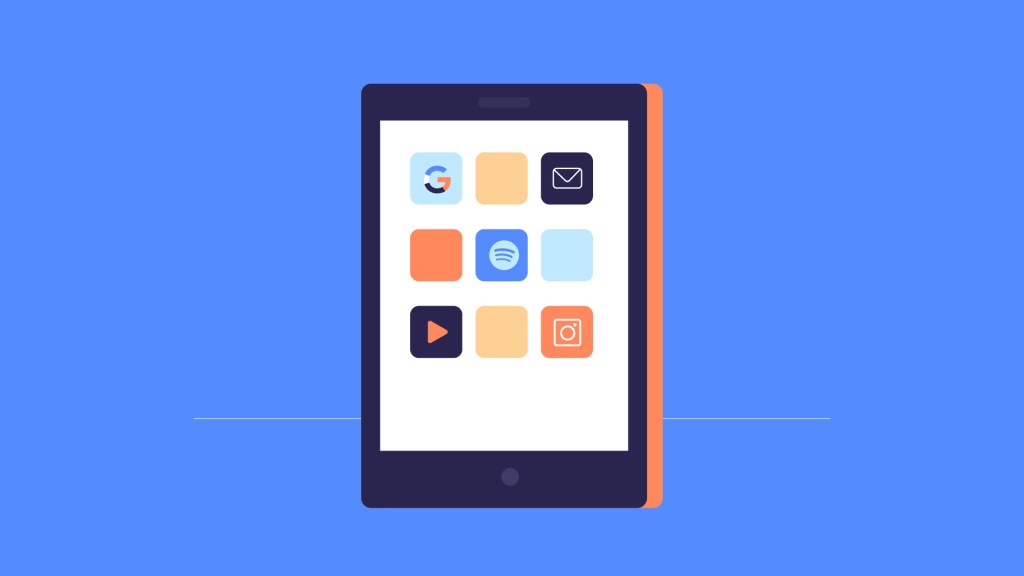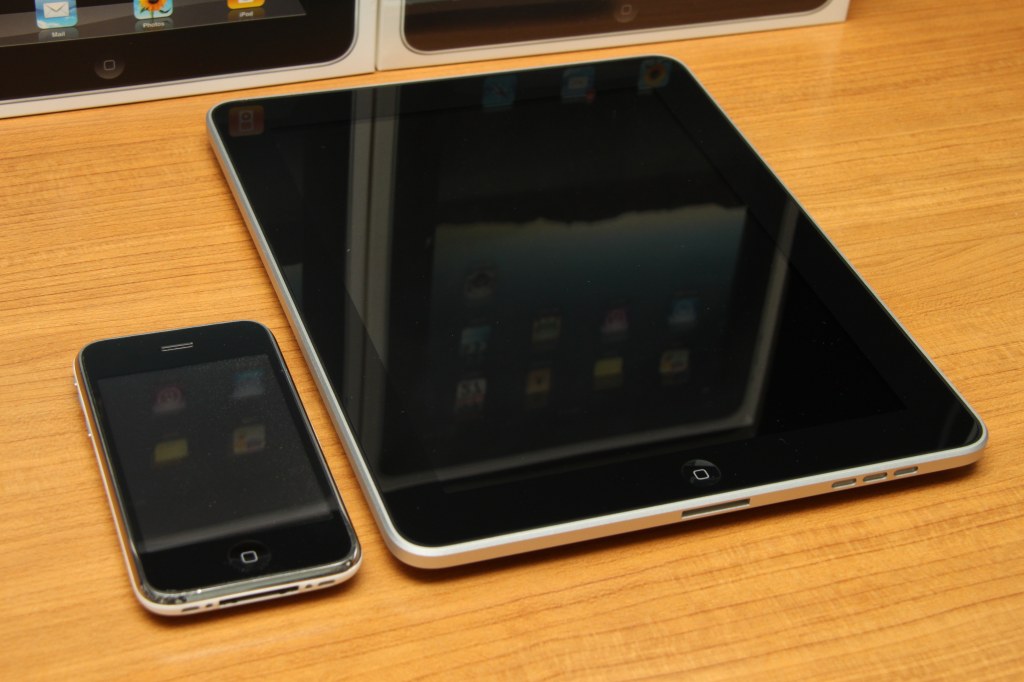The Ultimate Guide To Enhance Your Mobile Devices Experience: Unlocking Their Full Potential!
Mobile Devices: The Ultimate Guide to Staying Connected on the Go
Introduction
Hello Readers,
2 Picture Gallery: The Ultimate Guide To Enhance Your Mobile Devices Experience: Unlocking Their Full Potential!


Welcome to our comprehensive guide on mobile devices, the essential gadgets that have revolutionized the way we live, work, and communicate. In this article, we will explore the world of mobile devices, from their inception to their current impact on our daily lives. Join us as we delve into the fascinating realm of smartphones, tablets, and other portable devices that have become an integral part of our modern society.

Image Source: gcflearnfree.org
Without further ado, let’s dive in and explore the exciting world of mobile devices!
What Are Mobile Devices? 📱
Mobile devices are portable electronic gadgets that provide communication, computing, and entertainment capabilities on the go. These devices have transformed the way we connect with others and access information, offering a plethora of features and functionalities at our fingertips.
From the humble beginnings of early cell phones to the advanced smartphones and tablets of today, mobile devices have come a long way in terms of design, functionality, and connectivity.

Image Source: wikimedia.org
Let’s take a closer look at the key aspects and features of mobile devices.
Design and Form Factor ✨
Mobile devices come in various shapes and sizes, catering to different needs and preferences. They can be classified into different categories such as smartphones, tablets, smartwatches, and e-readers. Each type of device offers unique features and capabilities, catering to specific user requirements.
Smartphones, the most prevalent type of mobile device, combine the functionalities of a phone, camera, music player, and computer in one compact device. On the other hand, tablets provide a larger screen size, making them ideal for multimedia consumption, gaming, and productivity tasks.
Furthermore, smartwatches offer a convenient and hands-free way to access notifications, track fitness activities, and control other connected devices. E-readers, specifically designed for reading e-books, provide a lightweight and comfortable reading experience.
Connectivity and Communication 🌐
One of the most crucial aspects of mobile devices is their ability to connect with the internet and facilitate seamless communication. With the advent of cellular networks, Wi-Fi, and Bluetooth technology, mobile devices have become powerful tools for staying connected with others, regardless of location.
Smartphones and tablets offer a myriad of communication options, including voice calls, video calls, messaging apps, and social media platforms. These devices enable us to connect with friends, family, and colleagues in real-time, bridging geographical barriers and fostering global connectivity.
Moreover, mobile devices allow us to access emails, browse the internet, and engage in online activities effortlessly. The ability to stay connected on the go has transformed the way we work, learn, and socialize.
Features and Functionalities ⚙️
Mobile devices offer a wide range of features and functionalities that enhance our productivity, entertainment, and overall user experience. These devices are equipped with powerful processors, ample storage, high-resolution displays, and advanced camera systems, among other cutting-edge technologies.
Smartphones and tablets enable us to capture stunning photos and videos, play graphics-intensive games, stream high-quality content, and run various productivity apps. Additionally, mobile devices provide access to app stores, offering a vast ecosystem of applications catering to different interests and needs.
Furthermore, mobile devices have become essential tools for organizing our lives, with features such as calendars, reminders, note-taking apps, and virtual assistants, all readily available at our fingertips.
Operating Systems and Ecosystems 📲
Mobile devices operate on different operating systems (OS) that serve as the foundation for their functionalities and user interface. The most prominent mobile OSs include Android, iOS, and Windows. Each OS offers a unique user experience, app ecosystem, and integration with other devices and services.
Android, developed by Google, is the most widely used mobile OS globally, providing a customizable and open-source platform. iOS, developed by Apple, offers a seamless and secure ecosystem, exclusive to Apple devices. Windows OS, developed by Microsoft, provides a familiar interface and integration with Windows-based computers.
These diverse operating systems create a competitive landscape, driving innovation and offering users a choice that suits their preferences and requirements.
Security and Privacy 🔒
As mobile devices store vast amounts of personal and sensitive information, security and privacy are paramount considerations. Mobile operating systems incorporate various security features such as biometric authentication (fingerprint or facial recognition), encryption, and app permissions to protect user data.
Additionally, mobile devices are equipped with built-in security measures such as remote wipe, device encryption, and secure boot to safeguard against theft and unauthorized access.
However, it is essential for users to exercise caution and adopt best practices such as using strong passwords, keeping devices and applications up to date, and being mindful of suspicious links and apps.
Battery Life and Charging 🔋
Battery life is a crucial aspect of mobile devices, as their usability and portability depend on it. Manufacturers continuously strive to improve battery technologies, enabling longer usage times and faster charging capabilities.
Smartphones and tablets employ various techniques to optimize battery life, such as adaptive brightness, power-saving modes, and advanced power management features. Additionally, fast charging technologies have emerged, allowing users to quickly recharge their devices and minimize downtime.
Who Uses Mobile Devices? 🌍
Mobile devices have transcended geographical and demographic boundaries, becoming ubiquitous across the globe. People from all walks of life, spanning different age groups, professions, and interests, rely on mobile devices to stay connected and access information on the go.
Students use smartphones and tablets for educational purposes, accessing e-books, research materials, and educational apps. Professionals rely on mobile devices for communication, productivity tasks, and accessing work-related data.
The elderly benefit from the simplicity and accessibility of mobile devices for staying connected with loved ones and accessing essential services. Furthermore, mobile devices have become entertainment hubs, providing gaming, streaming, and social media experiences for people of all ages.
When Did Mobile Devices Become Popular? ⏰
The rise of mobile devices can be traced back to the late 20th century when cellular phones became commercially available. However, it was the introduction of smartphones in the late 2000s that revolutionized the mobile industry and propelled mobile devices into the mainstream.
With the launch of the iPhone in 2007, followed by Android-powered smartphones, mobile devices underwent a significant transformation, offering advanced functionalities, intuitive user interfaces, and a rich app ecosystem.
Since then, mobile devices have continued to evolve rapidly, with each iteration becoming more powerful, versatile, and integrated into our daily lives.
Where Are Mobile Devices Used? 🌎
Mobile devices are used in various settings, ranging from homes and offices to public spaces and transportation. They have become an integral part of our daily routines, seamlessly integrating into every aspect of our lives.
In homes, mobile devices serve as communication tools, entertainment centers, and smart home controllers. In offices, they facilitate productivity, communication, and collaboration among colleagues.
Public spaces such as cafes, parks, and airports have transformed into hubs for mobile device usage, providing Wi-Fi connectivity and charging stations to cater to the growing demand.
Furthermore, mobile devices accompany us during our travels, allowing us to capture memories, navigate unfamiliar territories, and stay connected with loved ones.
Why Are Mobile Devices Important? ❓
Mobile devices have become indispensable tools that offer a multitude of benefits and opportunities in our fast-paced, interconnected world.
First and foremost, mobile devices provide a means of communication, enabling us to connect with others anytime, anywhere. They facilitate efficient and instant interaction, fostering relationships, and bridging geographical barriers.
Moreover, mobile devices offer a wealth of knowledge and information at our fingertips. With access to the internet, we can explore diverse topics, learn new skills, and stay up to date with global news and events.
Mobile devices also empower us to be more productive and efficient. They serve as portable workstations, enabling us to respond to emails, access files, and collaborate with colleagues on the go.
Furthermore, mobile devices provide entertainment and relaxation, with a vast array of multimedia options available. From streaming movies and music to playing games and reading e-books, mobile devices offer endless possibilities for leisure and enjoyment.
Lastly, mobile devices have transformed industries and economies, driving innovation, creating new job opportunities, and enabling entrepreneurship. They have become essential tools for businesses, allowing them to reach customers, manage operations, and expand their reach globally.
How Do Mobile Devices Impact Our Lives? 💡
The impact of mobile devices on our lives cannot be overstated. They have revolutionized the way we communicate, work, learn, and entertain ourselves.
Mobile devices have made communication more accessible and convenient, ensuring that we are always connected with loved ones and colleagues. They have transformed social interactions, allowing us to stay connected with friends and family, even when physically apart.
In the workplace, mobile devices have fostered flexibility and remote collaboration, enabling professionals to work from anywhere and stay productive on the go.
Mobile devices have also democratized access to information and education. With the internet at our fingertips, we can learn new skills, pursue online courses, and access a wealth of knowledge, regardless of our geographical location.
Furthermore, mobile devices have reshaped the entertainment landscape, offering immersive gaming experiences, streaming services with vast content libraries, and social media platforms that connect us with a global audience.
Ultimately, mobile devices have become an integral part of our identity and lifestyle, empowering us to navigate the digital world with ease and enriching our lives in countless ways.
Advantages and Disadvantages of Mobile Devices 📲
Advantages 🌟
1. Convenience: Mobile devices offer unparalleled convenience, allowing us to carry a multitude of functionalities in our pockets.
2. Connectivity: They enable us to stay connected with others, access information, and engage in online activities from anywhere.
3. Productivity: Mobile devices serve as portable workstations, boosting our productivity and enabling us to multitask on the go.
4. Entertainment: They provide an extensive array of entertainment options, including gaming, streaming, and social media.
5. Access to Information: Mobile devices grant us instant access to vast amounts of information, facilitating learning and knowledge sharing.
Disadvantages ⚠️
1. Distraction: Mobile devices can be a source of distraction, diverting our attention from important tasks and real-life interactions.
2. Health Concerns: Excessive use of mobile devices can lead to physical discomfort, eye strain, and sedentary behavior.
3. Privacy and Security Risks: Mobile devices store a wealth of personal information, making them potential targets for cyber-attacks and privacy breaches.
4. Social Isolation: Overreliance on mobile devices can lead to decreased face-to-face interactions and a sense of social disconnection.
5. Addiction: The constant connectivity and instant gratification provided by mobile devices can contribute to addictive behaviors and excessive screen time.
Frequently Asked Questions (FAQ) ❓
1. Are mobile devices harmful to our health?
While the excessive use of mobile devices can lead to health concerns such as eye strain and sedentary behavior, moderate and responsible usage is generally considered safe. It is essential to adopt healthy habits such as taking breaks, practicing proper posture, and maintaining a balanced lifestyle.
2. Can mobile devices replace traditional computers?
Mobile devices have certainly bridged the gap between smartphones and computers, offering powerful capabilities and portability. However, traditional computers still excel in certain tasks requiring larger screens, extensive processing power, and specialized software. Mobile devices and computers often complement each other, catering to different needs and preferences.
3. How can I secure my mobile device?
To enhance the security of your mobile device, consider the following measures:
– Set a strong password, PIN, or pattern lock.
– Keep your device’s operating system and apps up to date.
– Be cautious of suspicious links, apps, and downloads.
– Install reliable security software and enable remote tracking and wiping.
– Use a secure Wi-Fi network and avoid connecting to public, unsecured networks.
4. How can I optimize the battery life of my mobile device?
To optimize your mobile device’s battery life:
– Adjust the screen brightness and use adaptive brightness settings.
– Enable power-saving mode when necessary.
– Close unnecessary background apps and processes.
– Disable features like GPS, Bluetooth, and Wi-Fi when not in use.
– Use the original charger and avoid overcharging or deep discharging the battery.
5. What is the future of mobile devices?
The future of mobile devices holds exciting advancements and possibilities. We can expect continued innovation in areas such as artificial intelligence, virtual reality, augmented reality, foldable displays, and 5G connectivity. Mobile devices will continue to evolve, offering enhanced user experiences and revolutionizing various industries.
Conclusion
In conclusion, mobile devices have transformed the way we live, work, and communicate. They have become indispensable tools that connect us with others, provide access to information, and offer a
This post topic: Latest Technology Trends


